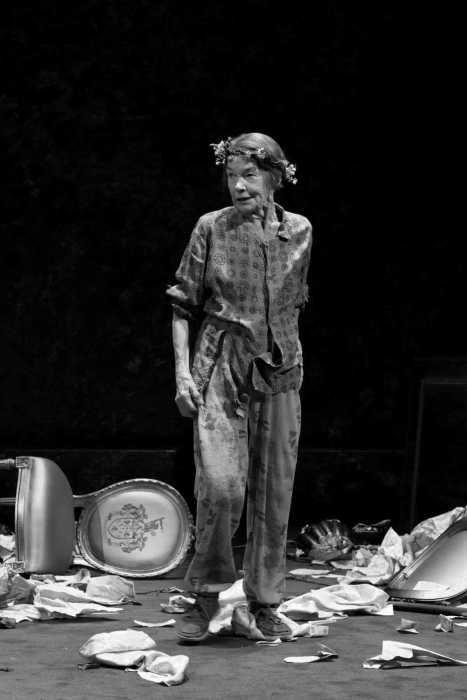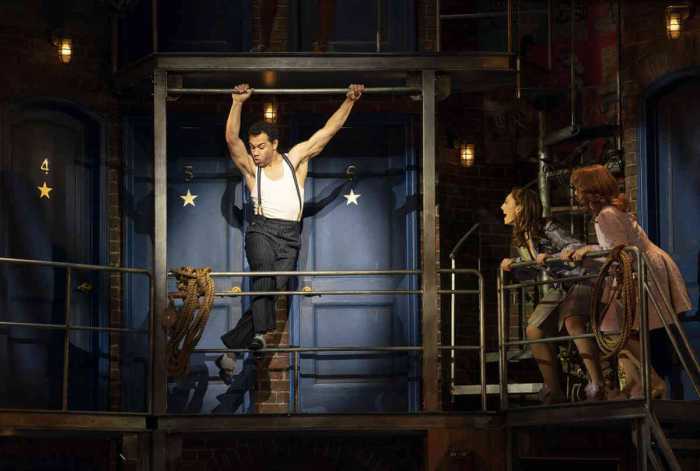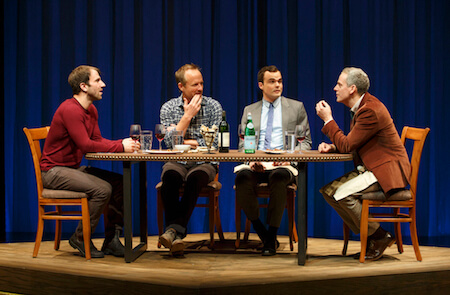Lorenzo Pisoni, Carson Elrod, and Jennifer Westfeldt in Nell Benjamin’s “The Explorers Club,” directed by Marc Bruni. | JOAN MARCUS
If Gilbert and Sullivan had teamed up with Kaufman and Hart, the result might be something like “The Explorers Club,” a silly, sprightly, and ultimately endearing comedy by Nell Benjamin set in a London gentleman’s club in 1879. The club is devoted to science, and the members, in stereotypically buffoonish Victorian fashion, fall all over themselves and each other (sometimes quite literally) to talk about their expeditions aimed at uncovering new flora, charming poisonous snakes, training guinea pigs, and finding the East Pole.
When the club’s young president, Lucius Fretway, proposes a woman for membership, life there goes topsy-turvy, especially when the woman in question, Phyllida Spotte-Hume, arrives to give a lecture along with a savage, whom she calls Luigi, she has rescued from an obscure nation and is proud of controlling with a spoon. Well, almost. When Luigi is presented to Queen Victoria, greeting her in his native fashion, an international crisis follows that embroils the Queen’s guard, revolutionary Irishmen, and a small army of lethal monks who have just arrived from the antipodes. Of course, it all works out in the end, but getting there is a lot of silliness. Benjamin manages to poke fun at the cavalier sexism and racism of the characters, while making it plenty clear these are the kind of fools who hurried the sundown of the British Empire.
Unexpected returns drive three intriguing plays
Marc Bruni has directed the piece with a rapid-fire pace, filling it up with sight gags, slapstick, and a recurring joke involving cocktail glasses that is as impressive as it is funny. The cast is virtually perfect. Lorenzo Pisoni as Lucius combines his unique talent for physical comedy with a persuasively lovestruck desperation for Phyllida. Lucius is always on a slow boil or the verge of a breakdown and seems to be the only character who knows what fools he’s dealing with.
Jennifer Westfeldt is delicious as both Phyllida and her twin sister. Carson Elrod is marvelously funny as the monosyllabic Luigi, and David Furr as the bombastic and idiotic Percy, the club member just back from the East Pole, is hilarious. The rest of the company — Brian Avers, Max Baker, Arnie Burton, and John McMartin — attack their parts with gusto, and even if their characters are stereotypical, they still land every moment and score every laugh.
It’s rare to find such unfettered and accomplished comedy that demands nothing of an audience but that they have a good time. Even in this beastly weather, it’s worth the trek to MTC, where you’ll be amply rewarded for your theatrical exploration.
Actors like Christopher Denham don’t come along that often. In the new play “The Unavoidable Disappearance of Tom Durnin,” he plays James, the son of the title character, a disgraced lawyer just released from jail. James’ confrontation with his father and his capitulation to him tell us everything about the history of their relationship — a reality the son knows but the father only understands as a fantasy he tries to recapture or recreate.
Denham conveys so much with a look, a slouch, a halting word that his character becomes a symbol for all the victims of greed and narcissism the Tom Durnins (read: Bernie Madoffs) of the world have created. The dynamic between father and son here is as disturbing and poignant as Willy Loman and Biff’s in “Death of a Salesman” — and is as much a reflection of our times as the Lomans were of theirs. Willy was inept and a dreamer, but Tom is a cruel and selfish man. Trying to insinuate himself back into the family and his old law practice, he shows he has not been humbled in the slightest. His facility for denial, his efforts to force his way into his old roles, and his rage at being rebuffed are as harrowing as any sociopath Hitchcock could imagine.
In addition to Denham’s rich and detailed performance, David Morse does an extraordinary job as Tom. Even when he attempts to be loving, there is a chilly gamesmanship in his actions that no amount of humiliation can diminish. Lisa Emery is excellent, as always, as Tom’s estranged wife Karen. Sarah Goldberg is lovely as Katie, the damaged soul James tries to reach out to, and Rich Sommer is good as Chris, the son-in-law Tom tries to manipulate to get back in touch with his daughter and ex-wife.
Scott Ellis directs with a sure hand that keeps the tension high throughout and elicits affecting realism from his actors. If only life’s Tom Durnins would really disappear.
Jan Maxwell and Jennifer Van Dyck in Howard Barker’s “The Castle,” directed by Richard Romagnoli. | STAN BAROUH
If you ever fantasized about living in the Middle Ages, a trip to “The Castle” by Howard Barker, now being staged by the Potomac Theater Project, will quickly disabuse you of any romantic notions. This dense and brashly lyrical piece is both entertaining and provocative, combining agitprop polemics with bawdy comedy, observations on the nature of government and religion, and girl-on-girl action.
England in the 12th century was a mess, as men returned from the Crusades and women had to give up the power they had acquired. The threats were not so much from the infidels as from civil war. The Church, too, was struggling to survive with its typical political malleability, using its supposed authority about the changing mysteries of the unknown to hide its self-serving hypocrisies. Power struggles were rampant, and the threat of imminent disaster was a daily concern. In other words, it was pretty much like today.
Barker’s plot is complex, but under the direction of Richard Romagnoli, the piece is clear and gripping. Jan Maxwell gives a dynamic and galvanizing performance as Skinner, a woman branded as a witch. Alternately heartbreaking and hilarious, Skinner has taken up with Ann, the wonderful Jennifer Van Dyck, while the men have been away. David Barlow is outstanding as Stucley, a knight back from the Crusades struggling to recapture Ann’s affections while trying to build an impenetrable castle, only to be constantly outstripped by his assumed enemies until the competition virtually destroys him.
This is challenging stuff, but the production’s boldness on a virtually bare stage resonates with theatricality that is never less than entirely engaging.
THE EXPLORERS CLUB | MTC City Center Stage 1 | 131 W. 55th St. | Tue.-Wed., Sun. at 7 p.m.; Thu.-Sat. at 8 p.m. Sat.-Sun. at 2 p.m. | $85 at nycitycenter.org or 212-581-1212
THE UNAVOIDABLE DISAPPEARANCE OF TOM DURNING | Roundabout at the Laura Pels Theatre, 111 W. 46th St. | Tue.-Sat 7:30 p.m.; Wed., Sat.-Sun. at 2 p.m. | $71-$81 at roundabouttheatre.org or 212-719-1300
THE CASTLE | Potomac Theatre Project at Atlantic Stage 2, 330 W.16th St. | In repertory with “Serious Money” | $30 | ovationtix.com for schedule & tickets




































